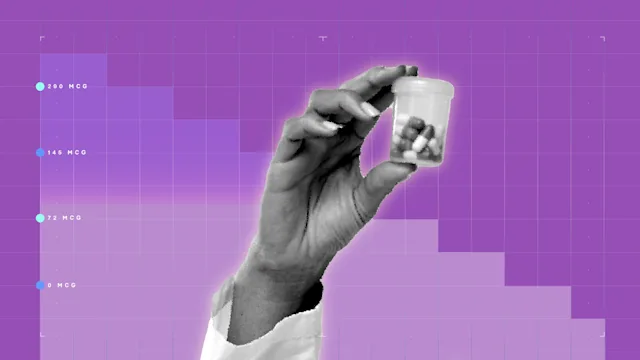Key takeaways:
Linzess (linaclotide) helps relieve chronic constipation. The most common Linzess side effects include diarrhea, bloating and gas, and stomach pain. Your prescriber may lower your Linzess dosage if these side effects are bothersome or don’t resolve on their own.
Heartburn and an increased risk of mild infections are also possible Linzess side effects.
Serious Linzess side effects are rare, but they can happen. Seek medical care right away if you experience blood in your stool, a fever that doesn’t go away, or severe diarrhea with symptoms of dehydration.
Save on related medications
Constipation is a condition that affects most people every now and then. Most of the time, you can increase your water and fiber intake or take an over-the-counter (OTC) laxative to help move things along. But for some, constipation becomes a chronic condition, and OTC medications aren’t enough to manage it.
Linzess (linaclotide) is FDA approved for treating chronic (long-term) constipation due to irritable bowel syndrome (IBS). It also treats chronic constipation with an idiopathic (unknown) cause. Your body doesn’t absorb Linzess. Instead, it passes through your gut and pulls fluid into your gastrointestinal (GI) tract. But you can still experience side effects from it. Here’s what you should know about possible Linzess side effects.
Linzess side effects overview
Below is a list of common and rare, but serious, Linzess side effects reported in clinical studies. This isn’t a list of all possible side effects. So it’s best to reach out to your healthcare team about any side effects you experience while taking Linzess, even if they aren’t listed here.
Common or mild Linzess side effects include:
Diarrhea
Stomach pain
Gas
Bloating
Headache
Acid reflux (heartburn)
Upper respiratory tract infection
Rare, but potentially serious Linzess side effects include:
Uncontrolled bowel movements
Vomiting
Severe diarrhea, leading to dehydration
Viral gastroenteritis (stomach flu)
Blood in the stool
Rectal bleeding
Linzess also has a boxed warning, the most serious type of FDA medication warning. Linzess should never be prescribed to children under 2 years old due to the risk of death from dehydration. The medication is only approved for children ages 6 and older.
Let’s take a closer look at five Linzess side effects in greater detail, including what to do if they occur.
1. Diarrhea and dehydration
Linzess helps relieve constipation, so it makes sense that the most common side effect is diarrhea. Most cases of diarrhea reported were mild. But severe diarrhea from Linzess is also possible, which can lead to dehydration.
Taking Linzess with a high-fat meal may increase the risk of diarrhea. So it’s best to take it on an empty stomach. Aim to take Linzess at least 30 minutes before your first meal of the day.
If you have diarrhea, try to stay hydrated by drinking plenty of water or electrolyte drinks. And be aware of the symptoms of dehydration, including:
Confusion
Dizziness
Dry mouth
Changes in heartbeat and blood pressure
Linzess (linaclotide) dosages: Learn about the recommended Linzess dosages and how to take it correctly.
IBS flare-ups: Read more about what causes irritable bowel syndrome (IBS) flares and how to prevent them.
How does Linzess work? Understanding how Linzess works in the body and how it’s different from laxatives can help you get the most from your medication.
If your diarrhea is bothersome, let your prescriber know. They may want to lower your Linzess dosage. But if you have dehydration symptoms or notice blood in your stool, seek medical care right away.
2. Gas and bloating
Gas and bloating are possible Linzess side effects. They’re also common symptoms of constipation. A buildup of gas in your belly can cause an unpleasant feeling of fullness or pressure in your stomach. You may also pass gas more often than usual as your body works to relieve the pressure.
Your gas and bloating may resolve as Linzess works to relieve your constipation. But you can help by avoiding food or drinks that trigger it. Examples of triggering items may include:
Soda and other carbonated drinks
Milk and dairy products
High-FODMAP foods, such as broccoli or baked beans
If your bloating and gas doesn’t go away with lifestyle changes, OTC medications such as simethicone (Gas-X) may also help.
If you experience severe stomach pain, vomiting, or have a hard time passing gas while taking Linzess, contact your prescriber right away. These symptoms may be signs of a more serious medical condition, like a bowel obstruction.
3. Stomach pain
Stomach pain is a common symptom of constipation. Linzess typically helps reduce muscle cramps and pain sensations in your gut. But as with bloating and gas, stomach pain is also a possible Linzess side effect.
To help ease stomach pain, you can try increasing your physical activity or fiber intake. It may help to keep a food diary and avoid foods that seem to trigger discomfort. If you also have bloating and gas, your stomach pain may also go away once those symptoms are treated.
Stomach pain while taking Linzess usually isn’t serious. But if it doesn’t go away or worsens, let your prescriber know.
4. Heartburn
In rare cases, Linzess can cause gastroesophageal reflux, or heartburn. Occasional heartburn will often go away on its own. To help manage it, try eating foods that are high in fiber and water and low in acidity.
If your heartburn becomes bothersome, an OTC medication may also help. With your prescriber’s OK, you can try one of the following options:
Antacids, such as calcium carbonate (Tums)
Histamine-2 blockers, such as famotidine (Pepcid AC)
Proton pump inhibitors, such as omeprazole (Prilosec)
If you have frequent heartburn or don’t see improvement with OTC medications, speak with your prescriber. And if you have heartburn along with chest pain or trouble breathing, seek immediate medical attention. These may be symptoms of a heart attack.
5. Infection
While taking Linzess, you may be at a higher risk for certain types of infections. Viral gastroenteritis (a stomach virus) and upper respiratory tract infections (such as the common cold) are more common in people taking Linzess than people who aren’t.
Try to stay hydrated if you have an infection. When you feel up to eating, try small, frequent meals of bland foods such as bananas, rice, and applesauce. Nausea medications can also help relieve your symptoms. Just check with your prescriber before taking them.
Typically, these infections will run their course and resolve on their own. But if you develop a fever that doesn’t go away, notice blood in your stool, or don’t feel like you’re getting better after a few days, reach out to your healthcare team.
Frequently asked questions
Linzess isn’t a colon-cleansing medication. It’s a daily medication for chronic constipation. Linzess isn't designed to clear out your GI tract the way some colonoscopy prep kits do. Instead, Linzess pulls fluid into your intestines as it moves through your system. This helps soften your stool to help it move through your gut.
No, in fact you’re supposed to take Linzess every day in order for it to work properly. Linzess isn’t an as-needed medication the way most laxatives are. Instead, it’s a daily medication you take to help treat and prevent chronic constipation. So taking it every day is a good thing, unless your prescriber tells you otherwise.
It’s best to avoid taking Linzess with high-fat foods. This could raise your risk of diarrhea. It’s also a good idea to avoid processed foods and items that are low in fiber. These food choices can worsen constipation symptoms, which could make Linzess less effective.
No drug interactions are reported in the labeling information for Linzess. But it’s best to avoid taking other laxatives along with Linzess, unless your prescriber tells you to. The combined effects of both medications could raise the risk of side effects such as severe diarrhea and dehydration. There could also be a higher risk of dehydration if you’re taking other medications that can cause fluid loss along with Linzess. This includes diuretics, anticholinergic medications, and some mental-health medications.
Linzess isn’t a colon-cleansing medication. It’s a daily medication for chronic constipation. Linzess isn't designed to clear out your GI tract the way some colonoscopy prep kits do. Instead, Linzess pulls fluid into your intestines as it moves through your system. This helps soften your stool to help it move through your gut.
No, in fact you’re supposed to take Linzess every day in order for it to work properly. Linzess isn’t an as-needed medication the way most laxatives are. Instead, it’s a daily medication you take to help treat and prevent chronic constipation. So taking it every day is a good thing, unless your prescriber tells you otherwise.
It’s best to avoid taking Linzess with high-fat foods. This could raise your risk of diarrhea. It’s also a good idea to avoid processed foods and items that are low in fiber. These food choices can worsen constipation symptoms, which could make Linzess less effective.
No drug interactions are reported in the labeling information for Linzess. But it’s best to avoid taking other laxatives along with Linzess, unless your prescriber tells you to. The combined effects of both medications could raise the risk of side effects such as severe diarrhea and dehydration. There could also be a higher risk of dehydration if you’re taking other medications that can cause fluid loss along with Linzess. This includes diuretics, anticholinergic medications, and some mental-health medications.
The bottom line
Linzess (linaclotide) helps relieve chronic constipation caused by irritable bowel syndrome (IBS) or with an unknown cause. Stomach-related side effects, including diarrhea, gas, and stomach pain, are common while taking Linzess. Your prescriber may lower your Linzess dose to help lessen these side effects.
Rare, but more serious Linzess side effects include severe diarrhea and dehydration as well as an increased risk of viral infections. Be sure to seek medical attention if you have blood in your stool, a fever that doesn’t go away, or severe stomach pain or diarrhea while taking Linzess.

Why trust our experts?



References
Allergan. (2025). Linzess- linaclotide capsule, gelatin coated [package insert]. DailyMed.
Bassotti, G., et al. (2021). Chronic idiopathic constipation in adults: A review on current guidelines and emerging treatment options. Clinical and Experimental Gastroenterology.
Levitt, M., et al. (2022). Belching, bloating, and flatulence. American College of Gastroenterology.
MedlinePlus. (2023). Dehydration.
MedlinePlus. (2024). Abdominal bloating.
Nathani, R. R., et al. (2025). Irritable bowel syndrome. StatPearls.
















